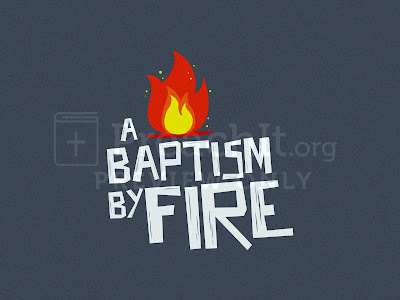11 Pentecost

August 24, 2025
Isaiah 58.9b-14;Hebrews 12.18-29
+ Last week in ourGospel reading, we heard Jesus talking about a baptism by fire, and how fire isa sign to us of God’s amazing and all-inclusive love for each and every one ofus.
Last week, Imentioned that when were baptized in those waters, we were also baptized in thefire of God’s spirit, into the fire of God’s all-consuming love.
And what do you know?Today, in the Letter to the Hebrews, we hear another fire reference to God. Wehear,
“indeed our God is aconsuming fire.”
In baptism, werealize how much of a consuming fire God actually is.
As paradoxical as itseems, we realize that in those waters, a fire was kindled in us. God’s firewas kindled in us.
And, to be aChristian, to be a follower of Jesus, means being aflame with the fires of ourbaptism.
But if we left itthere, we might still not understand the true ramifications of our baptism.
One thing you allknow I enjoy doing here at St. Stephan’s is inviting people to explore otherareas of the Book of Common Prayer, other than just our section concerning HolyCommunion.
So, let’s do so againtoday.
Let’s take a look atthe Catechism again.
There we get theanswer to the question:
“What is HolyBaptism?”
If you look on page858—there you will find the somewhat definitive answer.
On page 858, we findthis answer:
“Holy Baptism is the sacrament [a sacrament is an outward sign of God’s inwardgrace—the outward grace in this sense being the water] by which God adopts usas his children and make us members of Christ’s Body, the Church, andinheritors of the kingdom of God.”
It’s a really great definition of what baptism is.
So, in baptism, we becomelike Christ.
Holy Baptism is notthen just a sweet little service of sprinkling water on a baby’s head anddedicating them as we would a boat.
It is a service inwhich we are essentially re-born.
If anyone ever asksyou, “Are you a born-again Christian?” you can tell them, in no uncertainterms, that yes you are.
You were re-born inthe waters of baptism.
It is the service inwhich we recognize that we are truly children of a loving God—a God who trulyloves us.
We have been washedin those waters and made alive in the fire of God’s love and madenew—specifically we have become Christians in being baptized.
But, the one point I really want to drive home this morning is that last partof the definition from the Catechism. In baptism we become “inheritors of thekingdom of God.”
We are given aglimpse of this Kingdom of which we, the baptized, are inheritors in ourreadings from both Isaiah and Hebrews today.
In Isaiah, we hearthe prophet saying to us:
“If you remove theyoke from among you, the pointing of the finger, the speaking of evil, if youoffer your food to the hungry and satisfy the needs of the afflicted, then yourlight shall rise in the darkness and your gloom be like the noonday.”
Now, that’s some beautiful poetry, if you ask me.
“…your gloom [shall] be like the noonday.”
But more than that, it’s just so wonderfully practical.
When we followJesus—when we love God and love our neighbors—we are truly saying, “Yes, we areinheritors of the Kingdom of God.”
But, what does it mean to be an “inheritor of the kingdom of God?”
Being an inheritor ofGod’s kingdom means living out those promises we make in our baptismalcovenant.
It means proclaimingby word and example the Good News of Christ—that good news being Love God/loveothers.
It means seeking andserving Christ in all persons and loving everyone as we desire to be loved.
And it means strivingfor justice and peace.
And it means respectingthe dignity of the every human being.
And by doing thosethings, we are truly being the inheritors of that kingdom.
We become like Christ.
We become Christ tothose who need Christ in this world.
This is what it meansto be a Christian.
It is not just saying, “I accept Jesus Christ as my personal Lord and Savior”
It is not justsaying, “I belong to the one true Church, and that there is no salvationoutside of this Church.”
It not denying peoplethe Body and Blood of Jesus in the Eucharist because they don’t believe what webelieve.
It is not doingterrible things in this world over and over again, then thinking we can justsay, “oooops, sorry” and then go back and do it again.
It does not mean justbeing nice and thinking good thoughts all the time.
Being a Christian means both believing and then acting like one.
Being a Christian meansacting like Jesus—it means being like Jesus n this world.
Being a follower ofJesus means that we understand fully that something truly wonderful and amazinghappened to us when we were baptized.
In that baptismalfont in which we were baptized we were truly “buried with Christ in hisdeath.”
In those waters, weshared “in his resurrection.”
And through thosewaters—and that fire of God’s love that was kindled in us in those waters—wewere “reborn by the Holy Spirit.”
This is not light and fluffy stuff we’re dealing with here in baptism.
It is not all aboutclouds and flowers and sweet little lambs romping in the meadow.
It is not just “feelgood” spirituality.
It is the greatestevent in our lives.
It was alife-changing moment in our lives.
And this God weencounter today and throughout all our lives as Christians, as inheritors ofthe God’s Kingdom is truly, as the author of the letter to the Hebrews tells ustoday, “a consuming fire.”
God doesn’t let ussit back and be complacent.
God is not all rightwith us when we do bad things in this world, when we don’t respect the “worthand dignity” of others.
God is like a gnawingfire, kindled in that holy moment of baptism, deep within us.
God shakes us up andpushes us out into the world to serve others and to be the conduits throughwhich God’s kingdom—God’s very fire of love—comes into this world.
Baptism is a radicalthing.
I don’t think wefully realize that sometimes.
It changes us and it transformsus.
And it doesn’t justend when the water is dried on our foreheads and we leave the church.
It is something welive with forever.
In Baptism, we aremarked as Christ’s own forever.
Forever.
For all eternity.
And nothing we can docan undo that.
That’s why I lovebaptism so much.
That’s why it’s soimportant to remember our baptism.
My hope is that whenwe look at the font here at St. Stephen’s (whether we were baptized in it ornot) we will see it with special appreciation and will be able torecognize, in some way, the beauty of the event that happens here on a regular basis.
My hope is that, whenwe dip our fingers into that bowl of water and bless ourselves with thatblessed water, it will remind us of that incredible day in which we too werebaptized.
I hope we can alllook at that place in which baptism happens here at St. Stephen’s with a deepappreciation of how, we too, on the day of our baptism, were changed, how God’sconsuming fire was kindled in us and how we became childrenof a loving, inclusive God and “inheritors of the kingdom of God.”
We are inheritors of that unshakable Kingdom of God.
A
ll of us areinheritors of that Kingdom.No matter who we are.
For that fact let usbe truly thankful.
Let us, as the authorof Hebrews says to us today, “give thanks, by which we offer to God, anacceptable worship with reverence and awe; for indeed our God is a consumingfire.”
And let us, in turn,share that consuming fire we have inherited from our God with others.
Amen.



